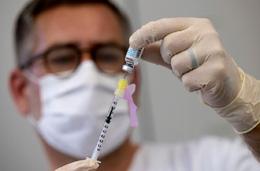Asia on high alert to stop Mpox spread

Asian nations are on heightened alert for mpox, formerly known as "monkeypox," following the World Health Organization's (WHO) urgent declaration of a global health emergency due to escalating cases across various countries.
The declaration underscores the seriousness of the situation as new infections emerge, prompting several Asian countries to implement rigorous surveillance and preventive measures to curb the spread of this contagious disease.
WHO Director-General Dr. Tedros Adhanom Ghebreyesus said; “it’s clear that a coordinated international response is needed to stop these outbreaks and save lives.”
Mpox is a highly infectious disease that can spread quickly through close contact. Symptoms include fever, headaches, muscular aches and large boil-like skin lesions. It is classified into two distinct groups: clade 1 and clade 2.
Clade 2 was responsible for the 2022 outbreak, which has led to around 100,000 cases worldwide, NBC News reported. Still, now, a version of Clade 1 has spread internationally, after starting in the Democratic Republic of Congo in January 2023.
The newer strain is more dangerous, with a case fatality rate of over 3 percent. It is also possible that infected individuals may transmit the virus several days before developing symptoms, making it harder to contain by identifying and isolating cases.
Last week, Sweden reported the first known case of clade 1 outside Africa. Then, the Philippines reported its first case of mpox since December of last year, although it has not yet identified the strain. Pakistan has also a case of the more deadly strain while Singapore has recorded ten cases since January.
A more contagious mpox variant is testing the readiness of Singapore and other Southeast Asian nations, prompting enhanced surveillance and precautionary measures across the region as healthcare experts express optimism about containing the virus.
A Singapore-based infectious diseases specialist stressed that children were more vulnerable to the new strain of the virus, warning that the virulence of mpox might be greater than anticipated.
“The spread may potentially be fast and furious, with speed similar to a hand, foot and mouth disease outbreak in a childcare facility,” said Leong Hoe Nam, a specialist at Mount Elizabeth Novena Hospital, though adding that Covid-like lockdowns were unlikely to curb mpox.
In Malaysia, all travellers from countries that have reported having mpox are required to monitor their health for 21 days after their arrival in the country, while those with a history of risky activities and symptoms like rashes must be examined at a health facility and avoid contact with other people.
The local authorities are also making moves to ensure that premises that provide services involving close contact with customers, such as spas or massage parlours, practise personal hygiene and keep their environment clean.
In Indonesia, foreign visitors must declare their medical records and recent travel history by filling in forms at entry gates, its health ministry’s acting director general of disease prevention and control said.
Paul Tambyah, president of the International Society for Infectious Diseases said
countries across the region, from Laos to Indonesia, have been able to detect mpox, which was “an indication that we will be able to recognize the disease and assess its spread”.
In an announcement last Friday, Chinese customs officials said all overseas arrivals would be screened for symptoms of the virus over the next six months. This will also apply to all aircraft and vessels, as well as containers and goods, arriving from pox-affected places, officials said.
China in 2022 classified mpox as a Class B infectious disease, allowing officials to take emergency measures such as restricting gatherings, suspending work and school or sealing off areas when there is an outbreak of a disease.
Hong Kong, which recorded 13 cases this year, said it would continue to "closely monitor" the situation and "enhance preventative measures" following WHO’s announcement.
"Members of the public are urged to heighten vigilance and avoid close physical contact with persons suspected of contracting mpox," officials said, adding that high-risk groups have been advised to receive vaccinations.
Japan’s Foreign Ministry issued a level-one health alert last Thursday, urging citizens travelling to or staying in seven African countries to exercise caution.
In India, health teams at international airports have also been made aware of the situation.
Health authorities have also announced that they will enhance surveillance in an effort to promptly detect potential cases, as well as improve laboratory testing capabilities for early diagnosis, officials added
The Korea Disease Control and Prevention Agency has said that while the mpox situation remains “manageable” under existing measures, but that it will still bolster quarantine and surveillance efforts. Korea is also planning to boost awareness campaigns to urge those with symptoms to go to a doctor immediately.
The Philippines has detected a new case of the mpox virus in the country, the first since December last year, its health department said, adding it was awaiting test results before being able to determine the strain.
The new case in the Philippines is the 10th laboratory-confirmed case the health department has detected. Its first case was in July 2022.
“Symptoms started more than a week ago with fever, which was followed four days later by findings of a distinct rash on the face, back, nape, trunk, groin, as well as palms and soles,” the Philippine DOH said in a statement.
A total of 99,176 cases of mpox were recorded worldwide from January 1, 2022, to June 30, 2024, including 208 deaths.
Canada’s first significant mpox outbreak occurred in 2022-2023, peaking in late June 2022 with a total of 1,541 cases reported. While case numbers declined following the initial outbreak, a gradual increase in infections has been observed since early 2024 — mainly in Toronto. – with agencies






